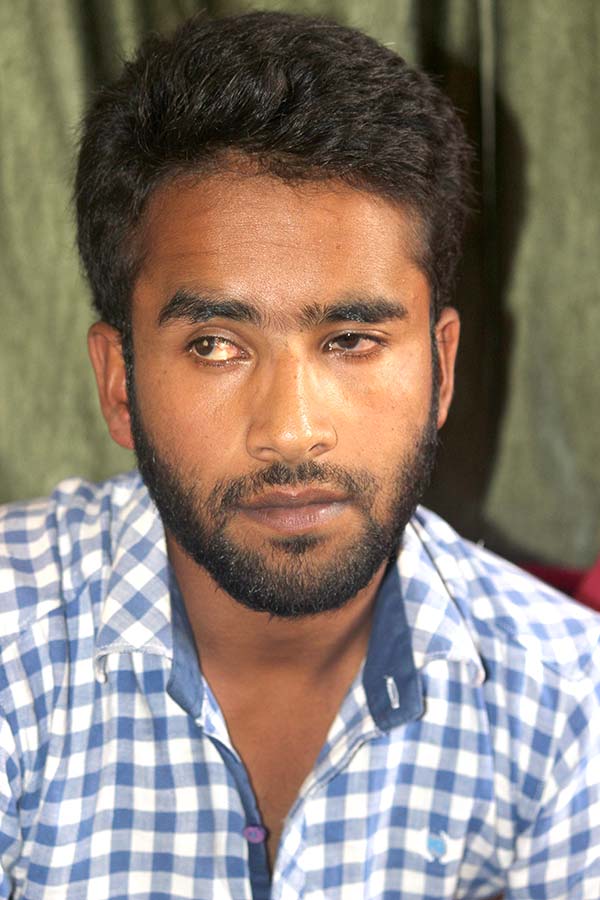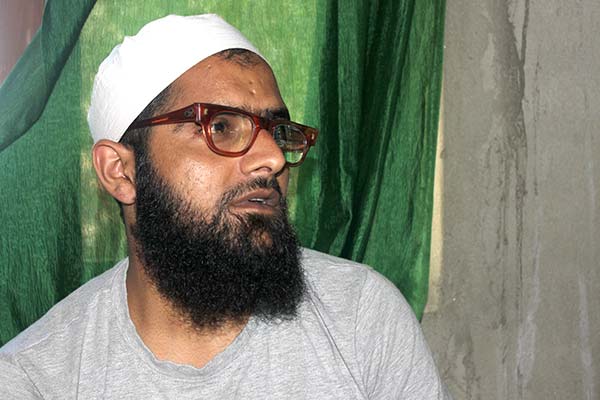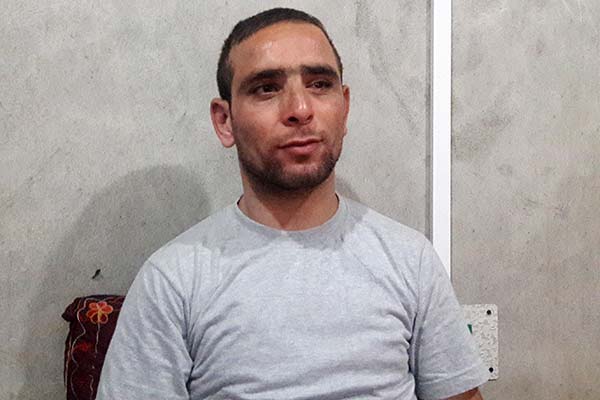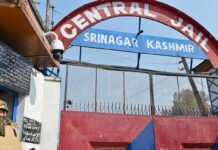It is everyday struggle for pellet victims who lost their eyesight completely in summer 2016. Confined to dark rooms they wait for divine intervention to see again, reports Zubair Sofi
 Danish Rajab, 20, walks with the help of walls to reach washroom for ablution. A resident of Kalwal mohallah in Srinagar’s Rainawari area, Danish is confined to his house after he was hit by pellets on July 17, 2016.
Danish Rajab, 20, walks with the help of walls to reach washroom for ablution. A resident of Kalwal mohallah in Srinagar’s Rainawari area, Danish is confined to his house after he was hit by pellets on July 17, 2016.
That day, Danish went out to spend some time with his friends after remaining under curfew for almost ten hours.
“After curfew was lifted from entire locality we went out and sat on a footpath in Rainawari chowk,” recalls Danish. “All of a sudden armed vehicles came and stopped at few meters away from us. Before we could have reacted they restored to tear-gas shelling.”
As tear-gas shells landed on the road, everyone started running for safety. “I turned around to see what has happened when a CRPF man fired pellet gun at my face. I was hit in my left eye,” said Danish. “I felt as if my eye had come out. I couldn’t see a thing.”
As a result Danish was left completely blind.
Now, sitting in a corner of his room, Danish curses himself for turning around and not running away like everyone else.
A famous cricketer in his locality Danish was main bread earner for his family. After passing Class 12 exams, Danish started working as marketing manager for a number of local enterprises. “I used to spend most of my time outside my home,” said Danish. And after work, he used to hang out with his friends near his house.
But after he was blinded by pellets, he has entered a different world where his eyes only see black color. First few weeks after the injury were most difficult for Danish as he needed help for almost everything from eating to a visit to the washroom.
“No one should go through what I am going through. There is no privacy left in my life,” said Danish. “I have to rely on others for even my personal needs.”
As the hope to see the world again faded forever, doctors fixed an artificial eye which he can’t move at will.
Danish’s only companion was his close friend Intiqhab Alam Malik, 20, who lives near his home. After attending his college Malik would come to Danish’s house and they both go out for a walk. He tries to keep Danish busy by talking to him on different topics. “I want to divert his attention from what he has witnessed,” said Malik. “I try my best to spend more time with him as I know he can’t share his miseries with anyone else.”
But at night Danish is all alone with no one to share his pain with. “There is nothing that can help me overcome my pain. I keep encouraging myself that one day Allah will cure me with his supernatural powers,” says Danish.
Over the months Danish has trained himself to mange a few daily chores like visiting washroom and kitchen. “My hands are my eyes now. I can sense my houses walls with them,” said Danish. But Danish still needs someone to help him go out of house.
 “I die many times in a day to see my son sitting in a corner and battle with himself. He keeps always smiling in front of us, and cry behind the door of his room,” said Mohammad Rajab Bhat.
“I die many times in a day to see my son sitting in a corner and battle with himself. He keeps always smiling in front of us, and cry behind the door of his room,” said Mohammad Rajab Bhat.
On festivals like Eid, Danish used to drive his bike straight towards their ancestral graveyard where his mother is buried and offer special prayers. But after his disability, he is not able to step out of his room. But Danish is not the lone victim of deadly hunter gun used by government forces in Kashmir.
Firdous Ahmad Dar, 25, an autorikshaw driver, who lives in Mazbug village of Sopore, feels his life is colourless now.
On July 15, 2016, while on his way back home from local mosque, he was shot in the eye with pellets. The injury left him completely blind in both eyes.
Firdous, who wears big glasses all the time to hide his eyes, lives in a single storey house with his parents and three siblings.
His father Gulzar Ahmad Dar, 65, sold two kanals of land to buy an autorickshaw for Firdous. “He used to help me run the family,” said Dar. “But everything changed after his disability.”
Despite old age Dar once again started working for sake of his family. “It is mostly people who help us to survive by collecting money,” said Dar.
Firdous now spends most of his time in a dimly lit room facing towards Makkah. “He finds solace in religion now,” said Dar.
Firdous’ siblings always stay around him, and recite verses from Quran whenever he asks. “I just want to see my family at least once,” said Firdous.
After Firodus’ was hit by pellets his neighbours collected money so that he can manage his expenditures for treatment.
“I die every minute. I keep thinking how my father will manage to run our family on his own. How will he manage my sister’s marriage?” asks Firdous.
Once in a while Firdous wants to go out and feel the wind. “My sister Khushboo acts as my support whenever I go out,” said Firdous.
Imtiyaz Ahmad Sofi, 21, who lives in Tarzooa village of Sopore, left home to offer Eid prayers. After prayers people took a protest march against the recent civilian killings in Kashmir. The forces stationed near the Eidghah first used tear-smoke shells and finally fired pellets at the protestors. One full cartridge of pellets hit Imtiyaz’s eyes. He was immediately taken to the hospital, where doctors told him his vision cannot be restored.
This was the second instance when Imtiyaz’s eyes were damaged. In 2003, Imtiyaz found a live grenade in a heap of garbage in his village. “We thought it’s a ball and started playing with it,” said Imtiyaz. “It exploded and damaged my right eye.”
Since then the vision in his right eye has recovered up to sixty percent. “But pellet injury left me completely blind,” said Imtiyaz. These two incidents turned Imtiyaz into a shy and silent boy.
 Now he stays alone in his room for hours without talking to anyone at all. At times he talks to himself loudly.
Now he stays alone in his room for hours without talking to anyone at all. At times he talks to himself loudly.
“I don’t like to talk to people, they keep asking me about my injuries which make me uncomfortable,” says Imtiyaz.
Firdous’ mother Rubeena, 35, tries to help her son forget his miseries and move on, but so far she has not been successful.
After clearing his Class 10 exams Imtiyaz dropped out of school and started working as an auto mechanic. “He doesn’t want to go out most of the time,” said Rubeena. “After every haircut he asks me ‘how do I look?’ This breaks my heart.”
Every morning he asks his mother, gaash awaha (is it morning yet).















